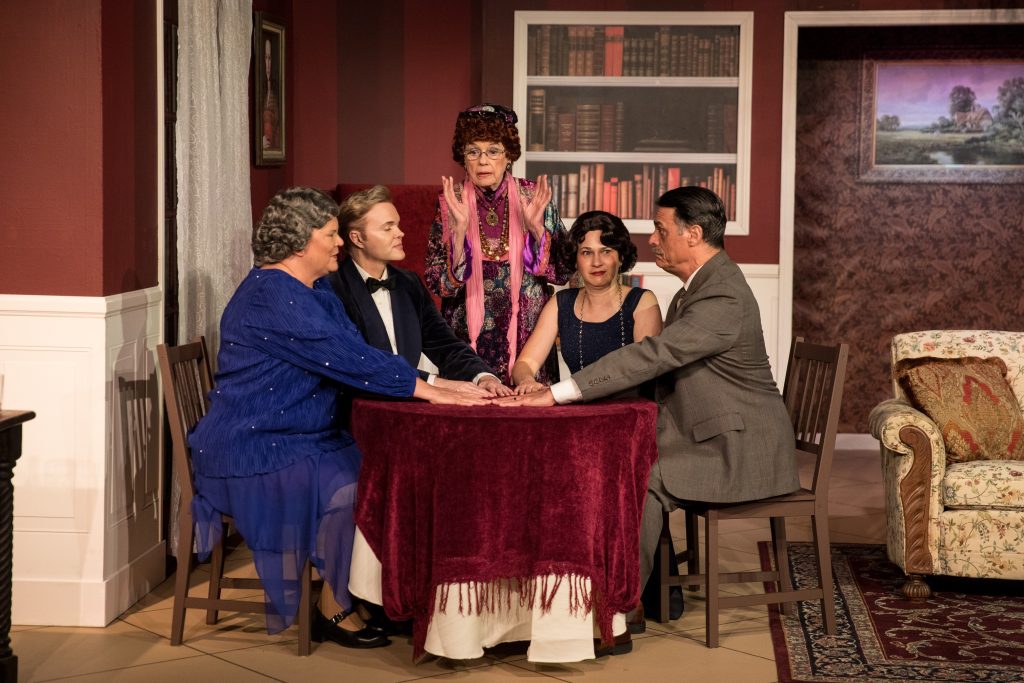
By Eric Marchese | Special to the NB Indy
Noël Coward’s comedy “Blithe Spirit” is typically played as a frivolous romp and at a generally superficial level.
Not at Newport Theatre Arts Center, where director Matt Koutroulis strikes gold by digging beneath the surface of the famed 1941 play.
Yes, laughs still abound, and Coward’s trademark wit and brilliance shine through nearly every scene and line of dialogue, but Koutroulis and company show how the script expertly intertwines humor with reality. The characters are taken seriously, and that adds welcome new layers to the fun.
In his latest work, novelist Charles Condomine (Jason Cook) plans to explore the world of the occult, so he and wife Ruth (Jessica Plotin) invite famed medium Madame Arcati (Judy Jones) to a dinner party at their posh home along with their friends, the Bradfords (Scott Keister and Julianne Bancroft).
While Madame Arcati is a “professional” spiritualist who makes a living conducting seances and investigating paranormal occurrences, Charles jokingly tells his wife and friends he’ll depict the medium in his new book as “a professional charlatan.”
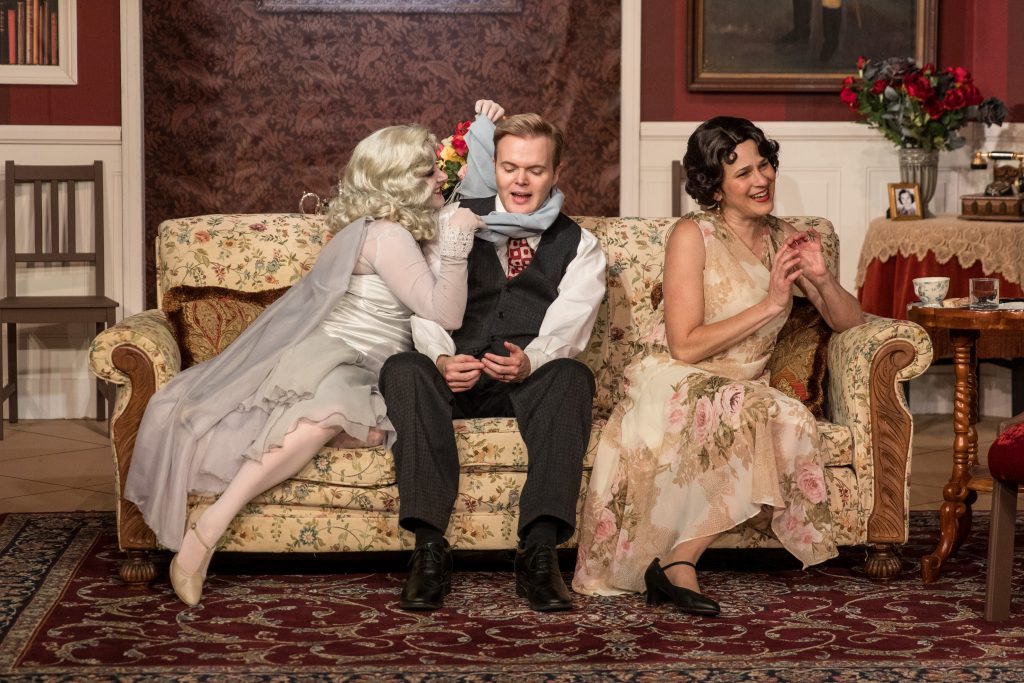
Perhaps somewhat predictably, Madame Arcati (with help from her otherworldly contact Daphne) causes the spirit of Charles’s deceased first wife Elvira (Victoria Leigh Serra) to rematerialize in ectoplasmic form in the Condomine home.
Charles is at first convinced Elvira is a hallucination and her presence an aberration – and that Ruth is “stolid” and “obtuse” for not believing him or being more sympathetic.
During the 1920s and ’30s, spiritualism was an absolute mania, and Coward deftly capitalizes on this with an after-dinner séance as the play’s focal point. We get complete (rather than partial) darkness, with the actors bathed in bluish-green lighting of the strange events. The scene is aptly eerie versus being silly and jokey on one hand or, on the other, leaden.
Coward generates the right amount and level of comic chaos as Elvira, seen and heard only by Charles, communicates with him alone, frustrating Ruth – and causing her to misinterpret words spoken to Elvira. It’s an odd, supernaturally funny way to depict a scenario Coward later terms “astral bigamy,”
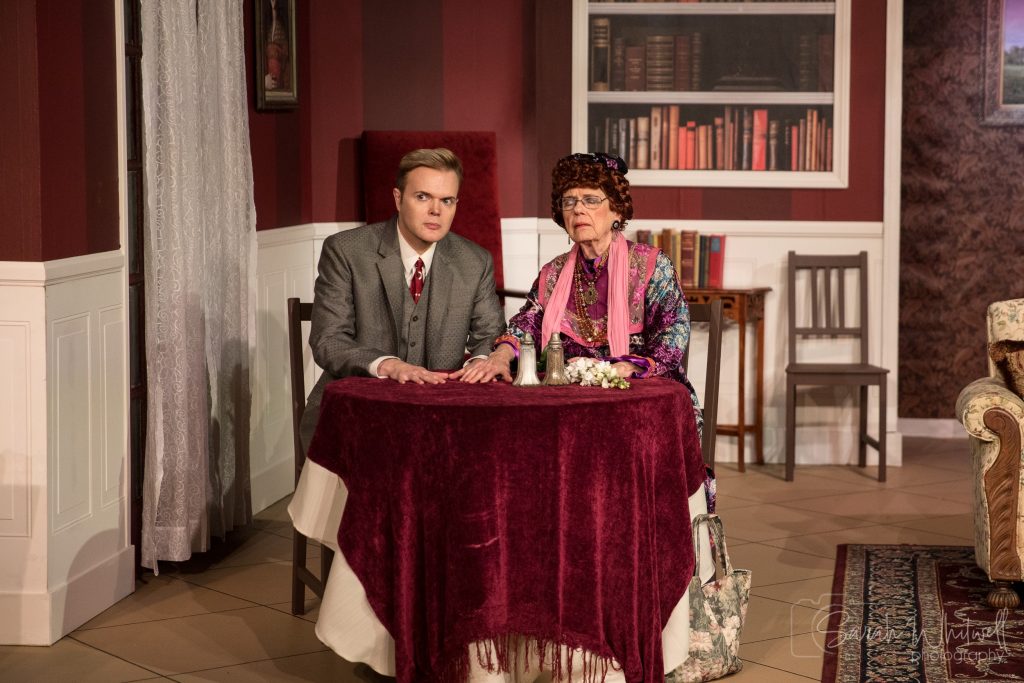
“Blithe Spirit” starts out as a drawing room comedy of manners, then veers toward the supernatural, and finally plumbs the complexities of marriage vis à vis how a man relates to wives former and current. It thus proves itself a comedic commentary on human nature (but with supernatural overtones).
Every cast member thankfully lacks the mannered performing style prevalent in the ’30s and early ’40s – a credit to Koutroulis and his actors, and Cook, Plotin and Serra superbly play out Coward’s concept of a physical-astral ménage à trois.
Cook and Plotin positively sparkle as Charles and Ruth, who are ultra-rich, and ultra-polished in the best Coward tradition – much like Elyot and Amanda from his “Private Lives.”
As opposed to an overly stuffy and plastic or phony persona, Cook’s manner is smoothly urbane. He wisely downplays the traits of vain egotism and “beastly” treatment of Chares’s wives noted in the script, using his beautiful voice and cultured mannerisms to display his character’s suave ennui.
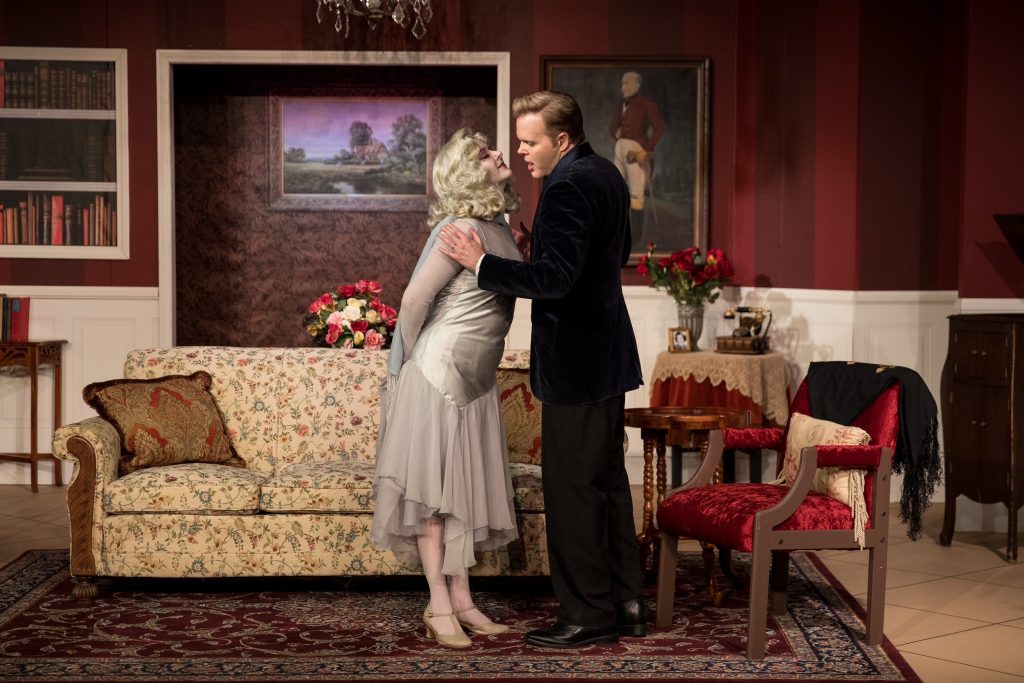
While the role of Ruth can sound one or two monotonous notes, Plotin skillfully crafts countless personality traits, and wins us over in doing so.
We get the nonchalant socialite, effervescent hostess, giggling flibbertigibbet, second wife outraged by her husband’s seeming preference of her predecessor over her, solicitous spouse convinced hubby has had too much of the sauce and not enough sleep, and woman exasperated and vexed in dealing with her now-erratic husband and his mischievous former wife’s spirit.
Serra shows Elvira’s impish, playful nature, yet deftly avoids stressing her petulance. She wisely underplays Elvira’s delight in causing turmoil in Charles and Ruth’s marriage – and we delight in seeing Charles caught in a vise between both wives, as Plotin, Serra and Cook excel in depicting frenzied scenarios.
Jones weaves the slightly off-the-wall persona at the center of NTAC’s staging, her bobbling voice telling us everything we need to know about Madame Arcati.
Jones aptly comes off as dotty, and dryly eccentric, and she and director Koutroulis wisely refrain from forcing the laughs. Jones avoids portraying a buffoon or using Arcati as mere comic relief, instead giving us a genuine, matter-of-fact woman who forthrightly presents herself to those she meets.
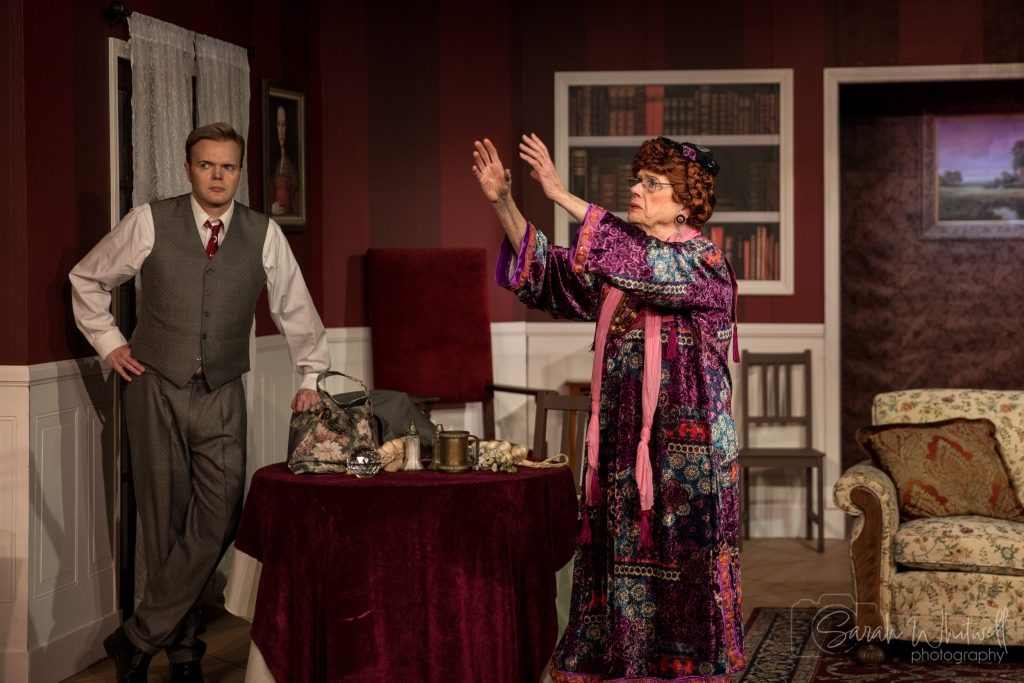
Keister’s Dr. Bradman is comically stuffy while taking the concept of being a polite guest to comical extremes, while Bancroft and Becky King make the most of the supporting roles of Mrs. Bradman and jittery young servant Edith.
Koutroulis’s cast imparts neither a contemporary acting style nor one borrowed from the period, and his cast’s dialects are spot-on – notably Cook, Plotin, Jones, Keister and Bancroft.
Rather than stereotypes, NTAC’s actors show us real people of privilege, with Charles and Ruth (and at times Madame Arcati) coming to grips with a supernatural scenario. Thanks to Coward, their plight might be riddled with hilarity, but thanks to NTAC, Charles and Ruth are utterly real and, therefore, wholly convincing.
Kat Scott and Jenny Wentworth’s costumes capture the elegant milieu of the characters. Serra’s appearance as Elvira is notably dazzling, the actor arrayed in glittery yet spectrally pale golden-green attire and (self-created) hair and makeup work.
In its design and construction by Jim Huffman, Joshua Serrano, Michael Corcoran and Leslye Wanthal, the set conveys the Condomines’s wealth, with luxurious furnishings that include a chandelier and Victrola and walls lined with rare paintings and books.
Toward the play’s conclusion, Coward wrestles with tying up every loose plot strand, which causes the staging’s pace to flag – a minor quibble, considering how consistently the dialogue and character portrayals ranges from delicate humor to more pronounced and overtly physical laughs. With this show at this venue, the playwright can be referred to as “NTAC” (“Noel ‘The Author’ Coward).”
In Newport Beach, we see that the masterful Coward has crafted something 100 percent tasteful – and something enjoyably theatrical that, as NTAC’s staging proves, has transcended time.
Newport Theatre Arts Center, 2501 Cliff Drive, Newport Beach. Through June 2. Running time: Two hours, 50 minutes (including intermission). 7:30 p.m. Thu.-Sat., 2 p.m. Sun. Tickets: $25. Ticket purchase / information: 949-631-0288, www.ntactickets.com.
